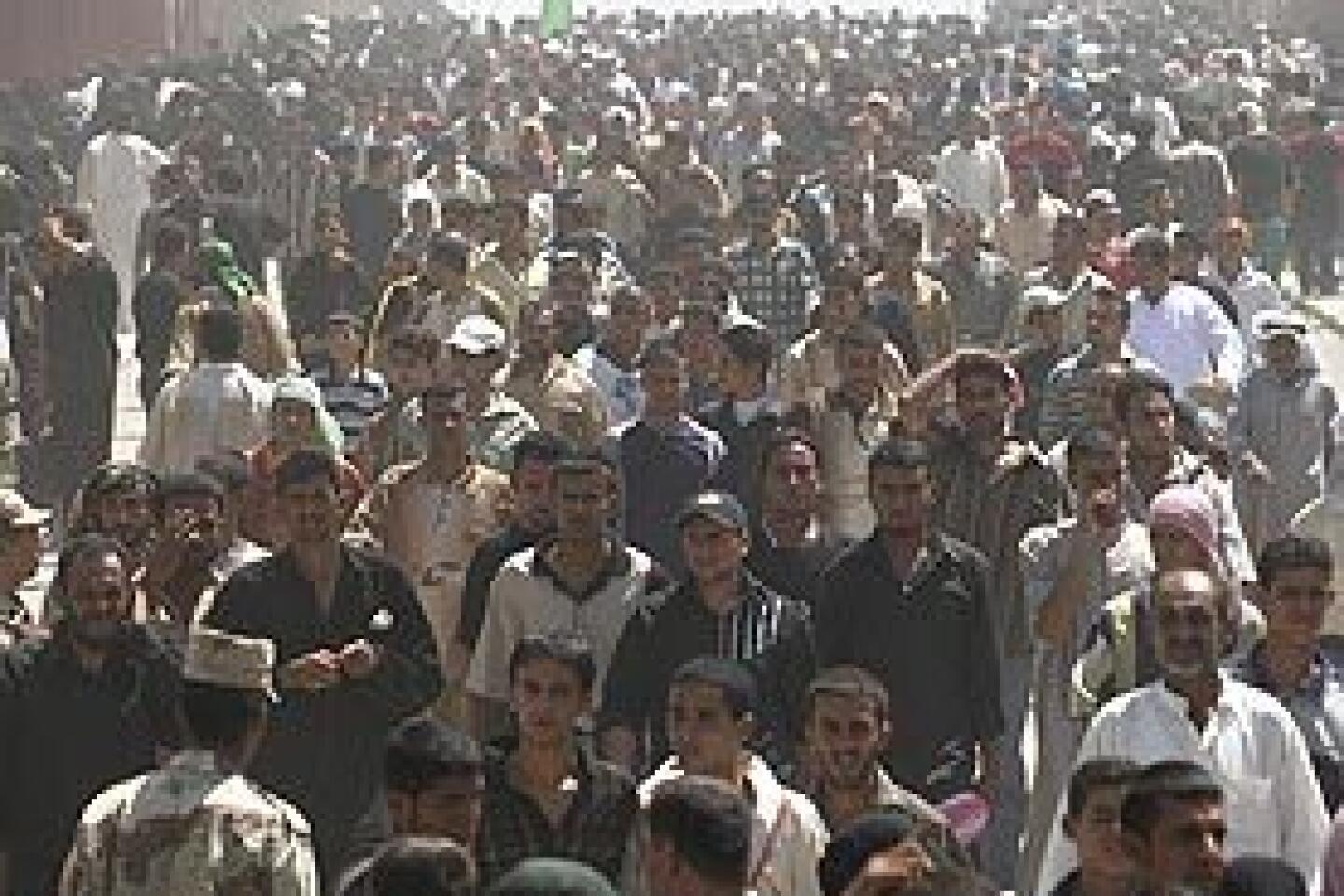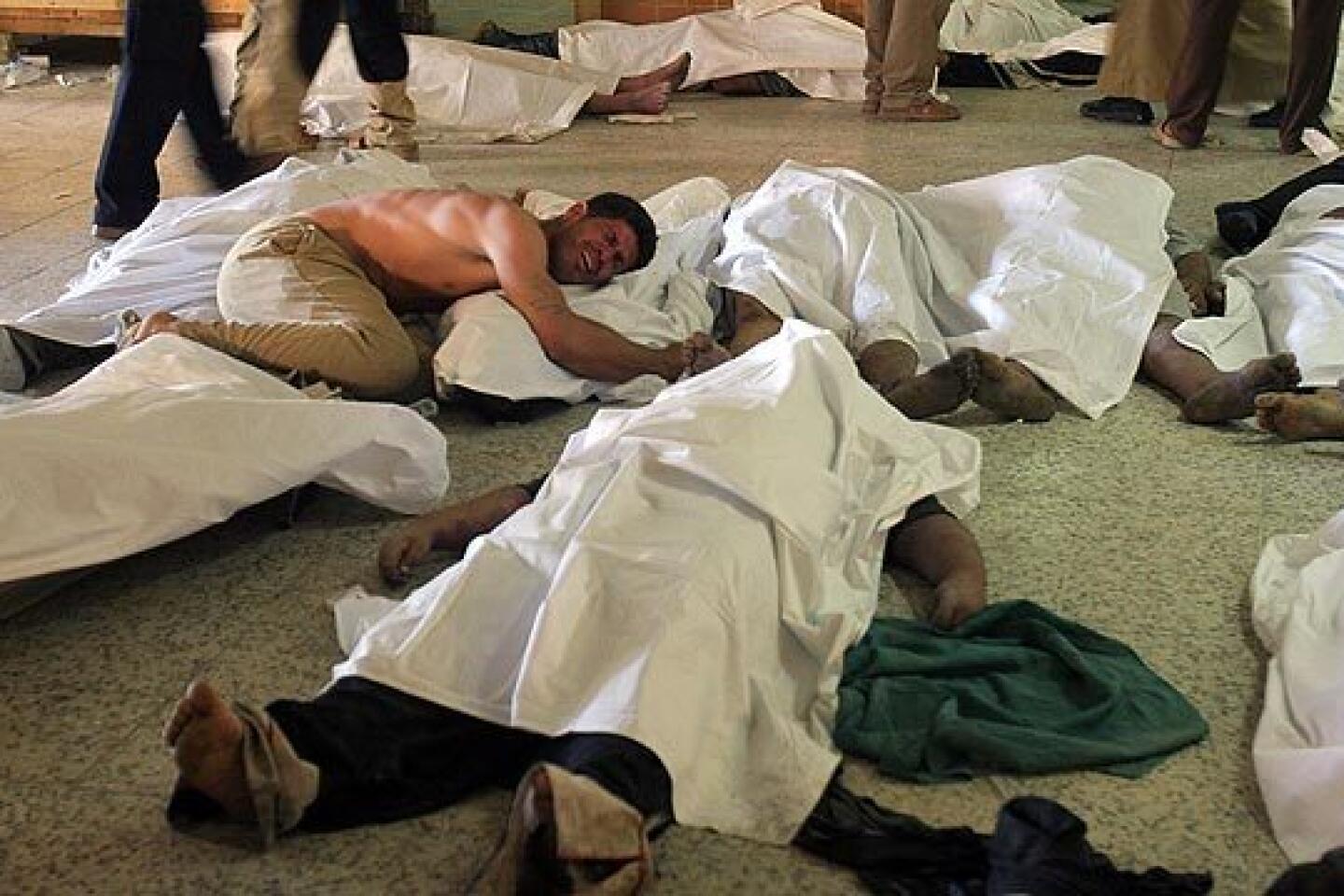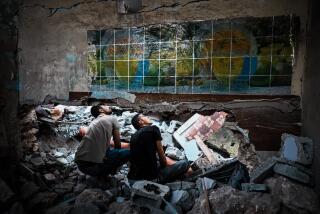For one Iraqi general, a tale of lost hope and honor
- Share via
CAIRO — Late at night, when he can’t sleep, the Iraqi general paces past the dimly lighted model homes and construction sites of his Cairo neighborhood. He avoids the main streets, crammed with shopping malls and restaurants. He doesn’t want to run into other Iraqis. He has enemies.
He slips back in after 1 a.m., careful not to disturb his wife, children and grandchildren. But still he can’t drift off. It will be close to dawn when finally he shuts his eyes, after exhausting himself thinking about how he will protect his family, how long his money will last. How he fell so far and ended up banished by the Iraqi government and forgotten by the Americans.
The fate of Maj. Gen. Jawad Rumi Daini is more than the story of one man’s disgrace. As the fifth anniversary of the invasion to oust Saddam Hussein nears, he serves as a singular witness to the hopes and horrors of the last five years: a man haunted by his role in a terrible stampede on a Baghdad bridge that left nearly 1,000 people dead; a man targeted for his involvement in the discovery of a Shiite police torture chamber; a man devastated by the killing of his son.
Some call Daini an honorable officer who sacrificed for his country. Others brand him a coward who accommodated Shiite militias and Sunni fighters alike.
In today’s Iraq, where nothing is black and white and motives are inscrutable, the answer may be somewhere in between. Even with fresh talk of reconciliation in his homeland, the 59-year-old has no hopes of returning: He saw too much as the country slid into civil war.
“I joined the old army and the new,” he said, “and lost both.”
The beginning
Daini watched the U.S. tanks and soldiers stream into Baghdad in April 2003. As an army veteran, he had been ordered by Hussein’s Baath Party to help lead his neighbors in resisting the Americans, but as soon as he saw their tremendous firepower, Daini recognized it as a lost cause.
He had fought in the 1980-88 war with Iran, and his reputation as a commander was sterling. But he was forced into retirement in July 1990, a month before Hussein’s ill-fated Kuwait invasion, after it was discovered that his brother had joined the Badr Brigade, an armed Shiite group then based in Iran that was dedicated to the overthrow of the Sunni-dominated regime in Baghdad.
“Daini was a big name,” recalled a Shiite politician who knew him in the Hussein years. Like others, he agreed to speak about Daini only on condition of anonymity, citing the sensitivity of the events in which Daini was involved. “He was a person who was independent, who did not follow a party or political direction.”
Retired, Daini dabbled in real estate and ran a farm south of Baghdad. But he was a soldier. The army was in his blood. “How can you be at home when the nation needs a man to protect it?” he said.
After the fall of Hussein, everyone was watching him -- insurgents and Iraqi officials. He was among the elite of the old Iraqi military, and he couldn’t stay neutral. People knew he would have to either join the nation’s new order or his old army comrades in the insurgency. The alternative was to risk being killed -- whether by gunmen affiliated with Shiite political parties or the so-called resistance. Within months, some Iraqi politicians had approached him and asked whether he would serve in the new U.S.-backed army.
“I thought it was appropriate for me to go back,” Daini said.
He reported for duty in January 2004. On the job, he and other officers started to counsel the Americans on how they should change their behavior. Civilians complained that U.S. soldiers pushed women and the elderly and locked up the wrong people on false tips. Daini recommended measures for searching houses and avoiding confrontation.
“I thought I was setting Iraq on the right path.”
His move was viewed as betrayal by former commanders who had joined the insurgency. Asked about Daini, one former general snapped, “Don’t talk to me about Jawad Rumi. Nobody does what he did.”
In October 2004, Daini established the 2nd Brigade of the 6th Division in east Baghdad, a territory encompassing the Sunni enclave of Adhamiya, which harbored Sunni insurgents, and Sadr City, the teeming slum where Shiite cleric Muqtada Sadr’s Mahdi Army militia held sway.
Daini prayed at both Sunni mosques and Shiite mosques to show that he represented all Iraqis. He perched children on his lap and read them stories. No one knew whether he was Shiite or Sunni. He consciously kept people in the dark about his sect.
“His biggest strength was he was a patriot,” a senior U.S. officer who worked closely with Daini told The Times. “He held himself above any ethnocentric focus. He was in it for Iraq to be a stable nation.”
In those early months, his men faced car bombings, suicide attacks and ambushes. Daini survived at least five assassination attempts. Despite his age, his slight paunch and double chin, he still could move quickly, and if shot at, he’d grab his rifle. After one ambush on his convoy, he charged down the street with his bodyguards, sprayed gunfire at the assailants and burned their house to the ground.
Like other officers in the new army, he quickly learned the limits of his power. Arresting Sunni or Shiite militants prompted complaints from the sects’ respective political leaders.
“When he captured some people from the Mahdi [Army], or some criminals or outlaws, some parties and people in Sadr City didn’t like him. It was the same thing in [Sunni] Adhamiya,” the Shiite politician lamented. “At that time, we said, ‘The one who works in these areas will be sacrificed.’ ”
The bridge
The songs rang out under a clear blue sky and searing heat for Imam Musa al Kadhim, a Shiite saint believed to have been poisoned in 799 by the caliph, a Sunni. At least 2 million Shiite pilgrims paraded through Baghdad on the anniversary of his death that August day in 2005.
They streamed into Adhamiya, an enclave of support for the insurgency; the green flags of Islam and the black flags of mourning fluttered in the streets. From there they crossed the steel-spanned Two Imams bridge over the Tigris to the saint’s tomb in west Baghdad -- in the imposing Imam Kadhim mosque complex with its twin gilded domes and towering minarets.
Daini stood on the Adhamiya side of the bridge, where he was in charge. He had prepared for 20 days with the Americans and his counterpart in Kadhimiya, Gen. Abdul Jalil Khalaf. With sectarian tensions at a boil and fearing a massive attack on Shiite pilgrims, they had searched the roads for bombs and snipers. The bridge had been sealed off with concrete barriers months before.
In the final hours before the pilgrimage, orders came down from the Defense Ministry: Open the bridge.
According to interviews with Iraqi and Western officials in the last year, the U.S. command in Baghdad had wanted to keep the bridge closed for the holiday, but a senior member of a Shiite party in the government called the defense minister and insisted that the barriers be removed. The Iraqi officers had no choice but to follow orders.
Daini removed the concrete blocks on his side of the bridge, but Khalaf cleared only a small pathway.
Shortly after 11 a.m., several mortar shells fell on the west side of the river, and shots were fired. The crowd panicked.
There was shouting about a suicide bomber, and the masses pushed and shoved on the bridge. With one side partially closed, some were crushed underfoot in the stampede and others dived into the river.
By the time it was over, nearly 1,000 people had been trampled or drowned, the worst death toll in a single event since the invasion in 2003.
Immediately after the disaster, Shiite clerics alleged that the army had been infiltrated by Sunni terrorists. Daini and Khalaf were called in for the first of several government inquiries.
At first, both he and Khalaf were cleared of blame. But the two men’s accounts conflicted. Daini insisted that he had informed Khalaf of orders to open the bridge, but Khalaf denied this. Both men had American commanders backing their version of events.
“Jawad was a kind of bumbling, unwitting stooge,” said another senior U.S. officer, “a small player in a greater plot which he did not understand.”
The Jadriya bunker
Violence continued as the December 2005 national elections approached. Sunni militants carried out a campaign of suicide bombings and Shiite militias abducted Sunni men, with many of their bodies dumped beside a sewage plant in east Baghdad.
Sunnis in Adhamiya held a protest, demanding to know the whereabouts of their relatives who had disappeared or been jailed by the national police, an elite force that included Shiite militiamen.
A tip from Daini about a missing 15-year-old boy helped track the teenager to a police bunker in the middle-class district of Jadriya. U.S. officers in Baghdad decided to raid the center and, knowing the move could strain U.S. relations with the Shiite elite, asked Daini to come along.
When they arrived, the building supervisor insisted that there were few detainees there. The Americans ignored him and broke down a locked door. It led into a cramped, dark hallway holding more than 160 detainees.
The troops gave IV fluids to the emaciated detainees, some bruised and some covered with blood.
They couldn’t find the boy they were looking for, but Daini recognized a teenager from his neighborhood who had been stopped by police at a checkpoint, clubbed with a rifle and taken away. His family had assumed he was dead and had held a funeral for him.
Afterward, Daini was criticized within the Iraqi army for not tipping them off about the raid.
“He was getting a lot of pressure from Ministry of Defense officials to lay low,” said the U.S. commander who supported Daini. “He stuck his neck on the line.”
After Samarra
After insurgents blew up the gold-domed Shiite shrine in Samarra in February 2006, Shiite militias roamed Baghdad. The capital was in the throes of sectarian war and Daini tried to help reassert control. He negotiated with the militias to release hostages and to abandon Sunni mosques, he said, but still fell afoul of them.
In June, Daini’s soldiers arrested four Mahdi Army members with a blood-coated knife and a list of 30 names, 20 of them crossed out. Daini said he soon got phone calls from the office of newly sworn-in Shiite Prime Minister Nouri Maliki asking for the men to be freed. Daini refused.
The prime minister’s office has denied interfering with Daini’s operations. However, U.S. military officers have confirmed that Maliki’s office often phoned army commanders with demands regarding arrests and operations.
Late on the night of July 2, Daini was inspecting checkpoints when he got a message on the radio: Come back to the base. A letter from the Cabinet had arrived releasing him from the army.
He headed home and slept. The next morning, he went to the base he had helped establish and collected his things.
U.S. commanders say Daini was fired over the Kadhimiya bridge disaster and the Jadriya bunker, calling the raid “a black eye” for the government. A senior Iraqi security official told The Times that the Defense Ministry had to make someone the fall guy for the stampede -- Khalaf had been more shrewd in cultivating people in power, so Daini was sacrificed.
Daini spoke on the phone and met with interpreters for U.S. Maj. Gen. J.D. Thurman, who commanded the Army in Baghdad, and Gen. George W. Casey Jr., head of U.S. forces. Their conversations always ended with apologies -- there was nothing they could do. The Iraqi government had the right to choose its commanders.
Some Iraqis and Americans had soured on him over allegations that he had contacts with armed Sunni and Shiite groups; others believed he was trying to broker deals to end violence in his areas. Regardless, U.S. commanders decided Daini wasn’t worth trying to save.
“Jawad tried to do the best he could, but he was scared to death of those factions out there that threatened him or his family,” said the U.S. commander who had been critical of Daini.
Then, on Nov. 23, there was a massive car bombing in Sadr City. Nearly 150 people were killed. Daini watched on TV as Hakim Zamili, the deputy health minster and a Sadr supporter, branded Daini a terrorist, accusing him of countenancing past attacks in east Baghdad. Daini turned to his 28-year-old son, Haidar, and said, “It is time to leave.”
Within days, Daini’s enemies struck. Armed men kidnapped Haidar one morning as he was on his way to work. By 10 p.m., his body had been found in a neighborhood controlled by the Mahdi Army. Daini believed the militia had killed his son.
Daini sent his wife and two daughters to Egypt. He stayed on, convinced that he could sell off their belongings, but no one would buy his home in west Baghdad or the family farm south of the capital. He sold his wife’s jewelry -- more than a pound of gold necklaces and bracelets.
He switched houses for safety almost daily as he continued to nurture a hope of selling his property. Finally, his wife phoned from Cairo and demanded that he leave. He couldn’t risk failing his wife and children, so he fled his homeland.
“My heart was hemorrhaging,” he said.
Egypt
On television, Daini watches Iraqi channels, where he spots his old colleagues. Sometimes Khalaf, the other general involved in the Kadhimiya stampede, appears. He has been appointed police chief in Basra. Daini wonders why Khalaf survived and he did not.
He believes that Khalaf, a close friend of Iraq’s current defense minister, had ties to militias and set him up to take the fall.
The month Daini’s son was killed, arrest warrants were issued against Khalaf and four of his officers accusing them of murder, extortion and complicity with militias. Within a week, the charges had been dropped and the case’s lead witness, an Iraqi lieutenant colonel, killed. Khalaf insists that the charges were trumped up.
Daini sounds bitter, and bereft, as he ponders his fate. The Defense Ministry cut his pension last fall and he worries that he will be arrested or killed if he returns home.
“Many Iraqi officers are all living happily. I am the only one who has suffered such tragedies: the death of my son, the destruction of my whole life,” he said.
“I never hurt anybody.”
More to Read
Sign up for Essential California
The most important California stories and recommendations in your inbox every morning.
You may occasionally receive promotional content from the Los Angeles Times.












